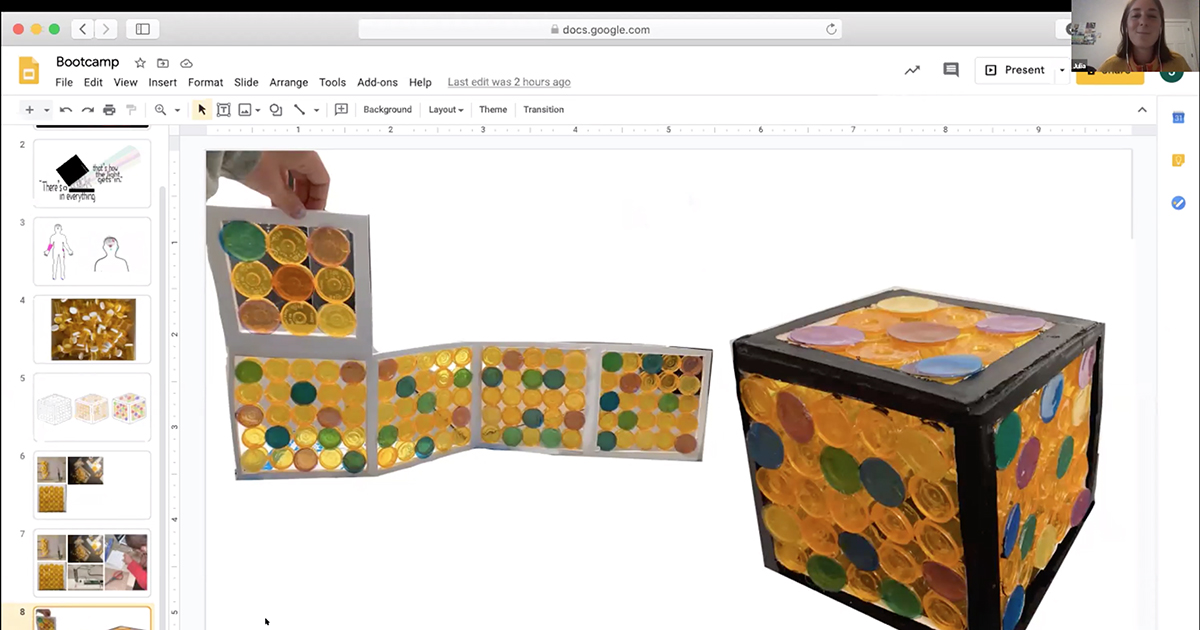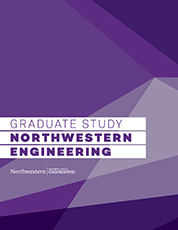Kintsugi: First-Year EDI Students Explore Art of Repair in 2020
EDI Boot Camp invites new students to build skills and community virtually through distributed design practice.

EDI Boot Camp provides students in Northwestern's Engineering Design Innovation (EDI) program the opportunity to become familiar with the tools and resources available to them throughout their EDI experience. Students build relationships with faculty, staff, and their cohort. As they work through Boot Camp workshops, they begin to explore who they are as a designer.
This year, EDI Boot Camp provided a real-life experience design case study when the COVID-19 pandemic forced the EDI team to create a completely virtual experience.
Current second-year students, Sophie Lancaster (EDI '20) and Diana Jeong Ro (EDI '20), served as Boot Camp leads for this year's event. The two sat down to talk about the challenge of reimagining such a critical in-person event, their reaction to the new students, and why their Boot Camp theme was perfect for this year.
How do you think Boot Camp went for the first-year students?
SOPHIE LANCASTER (EDI '20): We were absolutely blown away by how successfully first-year students navigated this unique experience. We were apprehensive about how Boot Camp would go, given its virtual nature, but the students made the most out of the experience.
What were the biggest challenges this year with having to adjust your plans due to the COVID-19 pandemic?
LANCASTER: One of the hardest parts of Boot Camp to replicate virtually was the short breaks students typically have to really engage with their classmates. In order to create this experience virtually, we used breakout rooms, hosted office hours and planned social events for the participants — all online. Additionally, without access to the shop and other physical prototyping tools, we were unsure what to expect for the final tangible project deliverables. However, this was an area where the first-years exceeded our expectations. The online constraints did not seem to hinder them and instead, resulted in out-of-the-box creativity such as using household items to create their final designs.
What was your thinking behind the Kintsugi theme?
DIANA JEONG RO (EDI '20): Kintsugi is the Japanese art of repairing broken pottery with gold, and as a philosophy it means to treat breakage and repair as part of the history of an object, rather than as something to disguise. Kintsugi was a perfect representation of Boot Camp this year, addressing many of the tumultuous events and lifestyle changes we endured and turning those scars into something golden and formative. We hoped to have students reflect on all of the ups and downs in their personal history to recognize what brought them to where they are today.
In what ways did you all demonstrate Kintsugi throughout Boot Camp?
JEONG RO: The very nature of this year's Boot Camp demonstrated the art of repair, as we needed to completely redesign what Boot Camp is as a remote experience. We realized we couldn't make it the same as in years past and needed to find ways to introduce the students to each other and the EDI family. One way we redesigned the experience was to have second-year students lead sessions such as, How to Succeed in Remote School or Virtual Happy Hours and Swolemates (doing workouts over Zoom together).
The first-years took the theme above and beyond, sharing their life experiences in their final projects. Each student took a unique spin on Kintsugi: we were completely wowed by how they used their limited materials to express themselves. They taught all of us how to succeed and make light of any situation.
How did your summer experiences, as well as your time in EDI last year, prepare you to lead this year’s Boot Camp?
LANCASTER: The EDI program is really good at growing your confidence as a designer. For example, through Designing Product Interactions (DPI) I learned how to prototype using foam core, through my Boot Camp experience I learned how to use the tools in the shop, and through Interaction Design I learned how to create wireframes in Figma. All of these skills prepared me to help lead Boot Camp and provided me with the confidence to help students in these areas.
What was the most important thing you hope first-year students took away from Boot Camp?
JEONG RO: We wanted the first-year students to keep it lighthearted. Boot Camp is one of the few opportunities to simply have fun and be free from pressure to deliver on anything other than themselves.

